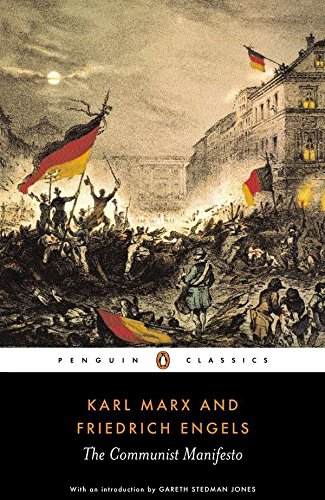About The Communist Manifesto
A rousing call to arms whose influence is still felt today
Originally published on the eve of the 1848 European revolutions, The Communist Manifesto is a condensed and incisive account of the worldview Marx and Engels developed during their hectic intellectual and political collaboration. Formulating the principles of dialectical materialism, they believed that labor creates wealth, hence capitalism is exploitive and antithetical to freedom.
This new edition includes an extensive introduction by Gareth Stedman Jones, Britain’s leading expert on Marx and Marxism, providing a complete course for students of The Communist Manifesto, and demonstrating not only the historical importance of the text, but also its place in the world today.
For more than seventy years, Penguin has been the leading publisher of classic literature in the English-speaking world. With more than 1,700 titles, Penguin Classics represents a global bookshelf of the best works throughout history and across genres and disciplines. Readers trust the series to provide authoritative texts enhanced by introductions and notes by distinguished scholars and contemporary authors, as well as up-to-date translations by award-winning translators.
- Complete Title: The Communist Manifesto
- Format: Paperback
- Language: English
- Number of Pages: 288
- Publication Time: January 1, 2002
- Publisher: Penguin Books
- ISBN: 0140447571
- ISBN13: 9780140447576
About Karl Marx
 Karl Marx
Karl Marx
Karl Marx, Ph.D. (University of Jena, 1841) was a social scientist who was a key contributor to the development of Communist theory.
Marx was born in Trier, a city then in the Kingdom of Prussia’s Province of the Lower Rhine. His father, born Jewish, converted to Protestantism shortly before Karl’s birth in response to a prohibition newly introduced into the Rhineland by the Prussian Kingdom on Jews practicing law. Educated at the Universities of Bonn, Jena, and Berlin, Marx founded the Socialist newspaper Vorwärts! in 1844 in Paris. After being expelled from France at the urging of the Prussian government, which “banished” Marx in absentia, Marx studied economics in Brussels. He and Engels founded the Communist League in 1847 and published the Communist Manifesto. After the failed revolution of 1848 in Germany, in which Marx participated, he eventually wound up in London. Marx worked as foreign correspondent for several U.S. publications. His Das Kapital came out in three volumes (1867, 1885 and 1894). Marx organized the International and helped found the Social Democratic Party of Germany. Although Marx was not religious, Bertrand Russell later remarked, “His belief that there is a cosmic force called Dialectical Materialism which governs human history independently of human volitions, is mere mythology” (Portraits from Memory, 1956). Marx once quipped, “All I know is that I am not a Marxist” (according to Engels in a letter to C. Schmidt; see Who’s Who in Hell by Warren Allen Smith). D. 1883.
Marx began co-operating with Bruno Bauer on editing Hegel’s Philosophy of Religion in 1840. Marx was also engaged in writing his doctoral thesis, The Difference Between the Democritean and Epicurean Philosophy of Nature, which he completed in 1841. It was described as “a daring and original piece of work in which Marx set out to show that theology must yield to the superior wisdom of philosophy”: the essay was controversial, particularly among the conservative professors at the University of Berlin. Marx decided, instead, to submit his thesis to the more liberal University of Jena, whose faculty awarded him his PhD in April 1841. As Marx and Bauer were both atheists, in March 1841 they began plans for a journal entitled Archiv des Atheismus (Atheistic Archives), but it never came to fruition.
Marx has been described as one of the most influential figures in human history. Marx is typically cited, with Émile Durkheim and Max Weber, as one of the three principal architects of modern social science.
More: http://en.wikipedia.org/wiki/Karl_Marx
http://plato.stanford.edu/entries/marx/
http://www.econlib.org/library/Enc/bi…
http://www.marxists.org/archive/marx/…
http://www.historyguide.org/intellect…
http://www.bbc.co.uk/history/historic…
http://www.spartacus.schoolnet.co.uk/…
http://www.britannica.com/EBchecked/t…
Reviews The Communist Manifesto
 Jeremy
Jeremy
Long overdue update (2013): I read this book five years ago and in almost every respect, I have mellowed considerably.You can read my review below. It’s unchanged. You can read the comments below that…
 Jason
Jason
Read this and understand why your imperialist capitalist government spent the better part of a century playing hot potato with ICBMs, invading and incinerating peaceful, peasant countries, and making…
 Sean Barrs
Sean Barrs
Communism doesn’t work. Its ideals are perfectly understandable, justifiable even, but the way it seeks to attain them, that’s just terrible. In reality communist policy falls apart or isn’t ful…
 Barry Pierce
Barry Pierce
What can I say? Marx was right. Almost…
 Jenna ❤ ❀ ❤
Jenna ❤ ❀ ❤
“You are horrified at our intending to do away with private property. But in your existing society, private property is already done away with for nine-tenths of the population.”The Communist Manifest…
 Darwin8u
Darwin8u
“Political power, properly so called, is merely the organised power of one class for oppressing another.”― Karl Marx, The Communist ManifestoVol 20 of my Penguin Little Black Classics Box Set. T…
 Always Pouting
Always Pouting
I finally read this even though someone gave it to me forever ago. I think the ideas are interesting but I think this functions more into explaining communist ideology in that historical period and fo…
 Leonard Gaya
Leonard Gaya
With a profuse beard, a Beethovenian hairstyle, a knack for well-chosen demonstrations and ground-breaking political ideas, Karl Marx was (still is) an idol. And The Communist Manifesto, although extr…
 Mike (the Paladin)
Mike (the Paladin)
Like many people (at least of my generation) I got this out of the library when I was in high school. You can’t describe this as “good” or “a good read” etc. I would however recommend reading this wit…
